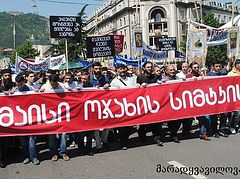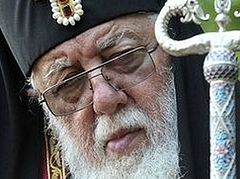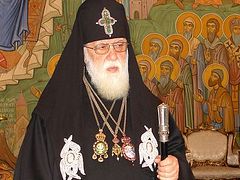Ius est ars boni et æqui.
Law is the art of the good and the fair.
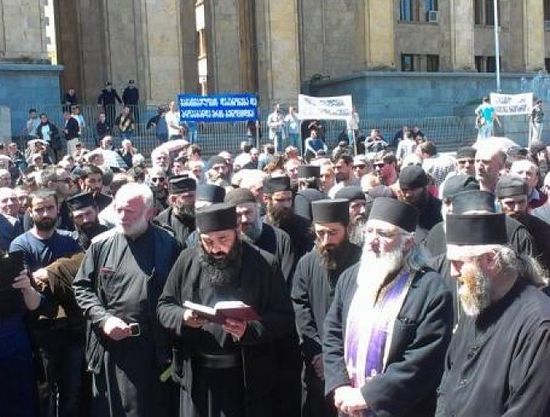 Protests of the faithful in front of the Georgian Parliament
Protests of the faithful in front of the Georgian Parliament On May 2 of this year a law was passed by the Georgian Parliament, “On the eradication of all forms of discrimination,” which provoked complaints from the Church and outrage from the public.
Catholicos-Patriarch of All Georgia, His Holiness and Beatitude Ilia II, gave an official announcement while the bill was being discussed, dated April 28 of this year, in which he expressed his disapproval. In particular, the following was stated:
“We have more than once stated earlier, and we emphasize now, that the Georgian Church considers violence and discrimination to be unacceptable, since the Christian religion is a religion of love and its teaching is founded upon love and mutual respect.” Further on, the significance of this bill for Georgia’s development was noted, and it was specified: “The introduction into this bill of terms that are not contained in the Constitution, such as “sexual orientation” and “gender identity,” provokes the indignation of the people, since the individual rights of our fellow citizens even without it are equally protected in Georgia by existing legislation.” The Primate of Georgia pointed to the public outrage over the aforementioned bill and, basing his words on Holy Scripture, elucidated: “Based on the Commandments of the Lord, the society of the faithful rightly considers non-traditional sexual relations to be a mortal sin, and the Antidiscrimination Bill in its submitted form to be propaganda and legalization of this sin.” The Catholicos-Patriarch warned: “This bill casts doubt on the basic moral principles recognized by all religions, which in turn is fraught with the danger of the beginnings of discrimination against broad classes of society.” Describing the European Union, His Holiness and Beatitude Ilia II noted: “The European Union is a diverse space uniting different nations and religions; according to their Declaration, the European Union recognizes the culture and traditions of the various peoples, and with respect to Georgia is also prepared to take our values into account and to respect them.” And therefore, “The demands of this bill are at variance with these principles.” At the end of his statement the Head of the Church of Georgia respectfully addressed the Parliament of Georgia with a request and called upon it “to defer passing the bill in its submitted form, and to ensure the involvement of the Church and the general public in its consideration in order to attain mutual agreement, so that hasty actions would not negatively influence our country’s aspirations towards Europe.”
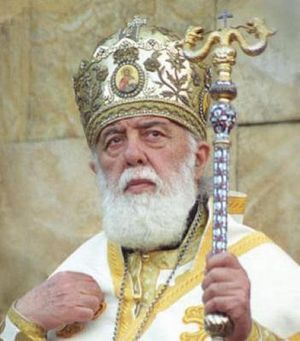 His Holiness the Catholicos-Patriarch of All Georgia Ilia II
His Holiness the Catholicos-Patriarch of All Georgia Ilia II “Incorrect information is being spread by the media, to the effect that, after certain amendments were made to the Antidiscrimination Bill for the Church, the bill became acceptable. The Patriarchate cannot agree with the new version of the bill, since we did not have the opportunity to analyze it. To make hasty conclusions on the basis of verbal assertions and statements by certain clergymen would be wrong.
“As submitted to Parliament in its original form, the negative sides of the law were obvious; but now the situation is different, and the law requires more thorough and serious study, and the conclusion of specialists (lawyers, psychologists, and experts in international law). We are grateful to the prime minister for the fact that he related to the Church’s cautious approach with understanding, but we wish to remark that the Church in this case was and is defending not only the interests and rights of the clergy, but also of that part of the Orthodox flock and the population of Georgia (regardless of religious confession) for whom the defense of moral norms is a fundamental necessity.”
However, in spite of the Patriarch’s statement, the authorities did not follow up on it and the law was passed.
Patriarch Ilia II: “How is it possible to allow lawlessness? To legalize iniquity is a great sin!”
On May 6 of this year, on the Feast of the Holy Great-Martyr George, the Primate of the Georgian Orthodox Church stated his opinion about the Antidiscrimination Law once more in his sermon at Holy Trinity Cathedral… ”I would like to briefly touch upon the topic that has caused great unrest in Georgia. I have in mind the Antidiscrimination Law. Georgia is a country which has never oppressed anyone in its whole history. Georgia is a country in which each person considers himself to be a free person. However, there are certain issues that can’t be tolerated. How is it possible to admit iniquity and lawlessness? To legalize iniquity is a great sin! And I was the one who declared this in front of everyone. I don’t know why some people found this fact so surprising. It would be surprising if I remained silent about such an important issue. I, as the Catholicos-Patriarch, am obliged to express my opinion in regards to this. Not a single Christian person will accept this law! I want to note that time will pass, and we ourselves will wonder how we in Georgia could have passed such a law! I offer up prayers that the All-Gracious and Merciful Lord would forgive our sins!”
Hierarchs continue to speak out about the Antidiscrimination Law in their addresses to the flock, and priests in their sermons; public figures in Georgia publish articles in the press… This law is discussed in the private conversations of ordinary citizens. All this testifies to the fact that Georgian society will not accept the Antidiscrimination Law and this topic remains very pressing to this day.
Below, we cite the opinions of two prominent hierarchs of the Georgian Orthodox Church: His Eminence Andrew (Andria) (Gvazava), Metropolitan of Gori and Ateni, and His Eminence John (Ioane) (Gamrekeli) Archbishop of Rustavi, chairman of the Educational Center of the Patriarchate of Georgia, president of the Gelati Academy, and Doctor of Theology.
***
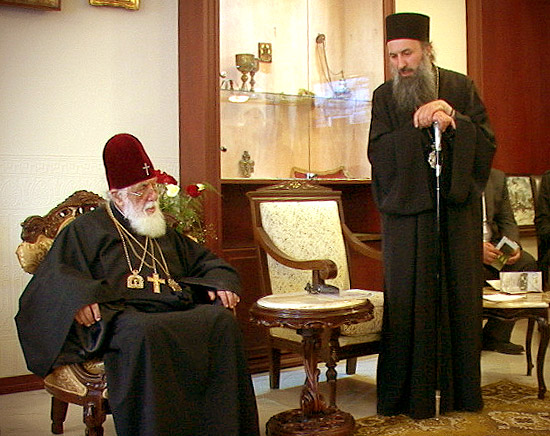 His Holiness the Catholicos-Patriarch of All Georgia Ilia II and Metropolitan Andrew (Gvazava) of Samtavisi and Gori
His Holiness the Catholicos-Patriarch of All Georgia Ilia II and Metropolitan Andrew (Gvazava) of Samtavisi and Gori “Vladyka[1] Andrew, one of the global challenges of our age is liberalism, which unfortunately has also found followers in our country. It is these liberal views that prepared the way for the passing of the Antidiscrimination Law. What do you think in this connection?”
Metropolitan Andrew (Gvazava), Metropolitan of Gori and Ateni
“As you know, freedom for an Orthodox person means freedom from the passions, the restoration of the original harmony that existed before the “sin of the first-born” (“original sin”), the acquiring of full unity with God—deification—which is possible only by the struggle against the passions and the renunciation of one’s own self, because sin took hold of human nature. A person’s morality depends upon the quality of his freedom. The essence of freedom was beautifully expressed and explained by the holy bishop Gabriel (Kikodze): “A person is free only when he chooses the good.”
“The Holy Apostle Paul writes in his Epistle to the Corinthians: “All things are lawful unto me, but I will not be brought under the power of any” (I Cor. 6:12).
“The chief concern of the Church, even when it is helping the needy materially, is directed towards the eternal lot of a person’s immortal soul. Faith in the Lord, worship of Him, the fulfilling of God’s commandments mean a righteous and moral life. That is what defines a nation’s worthiness. As regards nationalism, in Christianity it means concern about the correction of the failings of one’s people, and also the defense of those traditions and customs that are fundamental to its unique identity and individuality. At the same time, all this governs our respect and goodwill towards other peoples and nations.
The danger for society lies precisely in an incorrect interpretation of the concept of “national identity” and “personal freedom.”
“Two Georgian geniuses, great fathers of our nation, stated in their works what the concepts of “national identity” and “personal freedom” mean in the Christian understanding of the terms. I have in mind the journalistic works of Holy Righteous Ilia (Chavchavadze) The Outcast in Us and Vazha Pshavela What is Freedom?[2] From their reasoning it follows that the danger for our society lies hidden precisely in an incorrect interpretation of the concept of ‘national identity’ and ‘personal freedom,’ which advances liberalism. The reason for this lies in the fact that liberalism came into being in the bosom of a society that has shunned ancient Church Tradition. And if anyone really wants to return to the roots of Christianity, he has to turn to the one and only truth—the Commandments of our Lord Jesus Christ, which the Orthodox Church has preserved unchanged for two millennia—and then everything will fall into place.
The main principle of liberalism is the idea of a person who has distanced himself from God and is in a state of sin.
“Unfortunately, the main principle of liberalism in its contemporary understanding is the idea of a person who has distanced himself from God and is in a state of sin. Liberalism considers this to be a person’s natural (normal) state, as well as the satisfaction of any and every passion as long as it is not prohibited by law. This is just how liberalism wrongly interprets personal freedom.
“Today national dignity and faith is being violated by every means; this is aimed at blasting the foundations of society, the degradation of our traditions and way of life, and here, unfortunately, the media plays a large role. A person’s personal sin is his own problem and decides his final destiny, but the public teaching of sin and its promotion perverts and destroy all of society!
“In recent years, on the basis of a unanimous decision by the Georgian clergy and the Orthodox public, on the direct initiative of our Patriarch, many Church and state figures who fought against imperialism and communism, defenders of national identity, have been canonized by the Holy Synod of the Georgian Orthodox Church. Some of them are: Tsar Solomon II of Imeretia, Metropolitans Dositheus Kutaisi and Evthemius Gaenati, Dimitri Kipiani, Bishop Gabriel (Kikodze), Ilia Chavchavadze, Patriarchs Kirion II and Ambrose (Khelaya), the brothers Karbelashvili, and Archimandrite Gabriel (Urgebadze)…
“It is worth noting that His Holiness and Beatitude Ilia II, Catholicos-Patriarch of All Georgia, as well as our church hierarchs have personally, more than once expressed their unbending commitment to the ideas of Georgia’s independence and territorial integrity, including from international platforms.
“Government administration should be carried out by laws that are imbued with the spirit of the Bible. We recall the definition cited in the Digests, compiled by one of the greatest Byzantine emperors, the codifier of Roman law, Justinian the Great: ‘Ius est ars boni et аequi’—‘Law is the art of the good and the fair.’
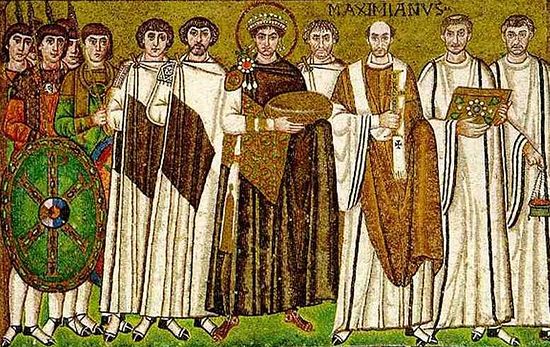 Emperor Justinian the Great with his retinue. Church of St. Vitalis in Ravenna, 548 A.D.
Emperor Justinian the Great with his retinue. Church of St. Vitalis in Ravenna, 548 A.D. “As you know, the Apostles received the Christian truth in all its fullness on the day of the Descent of the Holy Spirit. Afterwards, this grace and this knowledge have been preserved in the Orthodox Church. No one has the power either to “develop” them, or to raise them to “a new level.”
“The Holy Fathers of the Church, the great theologians, interpreted Holy Scripture and passed on the opinion of the Church in connection with various teachings and issues that disturbed the society of that era. And although the works of many contemporary Orthodox theologians (Greek, Serbian, Romanian, American, French, et al.) unfortunately have not yet been translated into Georgian, nevertheless we know about them and, believe me, you will find no support for liberalism there! And, based on them, we express our opinion.
“Who defines those universally recognized moral norms, the violation of which is completely inadmissible? Morality is a very, very comprehensive concept. It is a combination of such virtues as self-sacrifice, goodness, mercy, respect for one’s elders, love for one’s native land, the creation of a respectable family, the upbringing of good children, and so on.
It can never be possible for someone who is malicious, who is a murderer, who is lecherous, who is a traitor, … to be worthy of the name “human being.”
“Everything changes in our life—time and people; but no matter how hard we try to introduce ‘new moral values,’ it can never be possible for someone who is malicious, who is a murderer, who is lecherous, who is a traitor, who is a swindler or who hates his brother to be worthy of the name ‘human being.’ And it doesn’t matter if the person is a Christian or not, because virtue is a universal value!
“Therefore we believe that only society must decide what behavior is considered to be immoral, amoral, deserving of condemnation and goes beyond the bounds of the minimum threshold of morality. The prerogative of the state, however, is the criminalization of this or that act which presents various levels of danger.
“Based on what has been said above, we consider it completely inadmissible to leave the Antidiscrimination Law in its present form, since, in the opinion of the absolute majority of the population of our country, it does not fit within the framework of any morals!
“The Georgian Church—together with the best sons of our Fatherland—has always fought and will always fight in the future for the preservation of the national identity, moral foundations, and spiritual values of our Orthodox society.”
***
“Vladyka John, please tell us why, in your opinion, the Antidiscrimination Law is inadmissible, and what dangers might be concealed within it for the future.”
Metropolitan John (Gamrekeli) of Rustavi
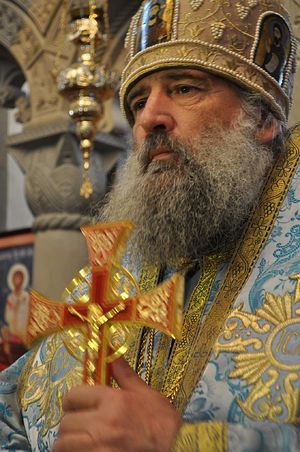 Metropolitan John (Gamrekeli) of Rustavi
Metropolitan John (Gamrekeli) of Rustavi In Article I of the Antidiscrimination Law, the equality of all citizens is declared before the law, in spite of the differences between them, which, of course, is guaranteed even without this by the fundamental law of the State—the Constitution. Furthermore the Antidiscrimination Law adds such terms as “sexual orientation,” “gender identity” and “marriage state.” The Patriarchate has requested that these concepts be clarified, since they were not included in the Constitution before. The answer to this request was not forthcoming. The question arises: Are “sex” and “gender” synonymous? We all know that there are two sexes and the civil rights of both are protected by the Constitution; but how many genders exist, and what is to be understood by the term “gender identity?”
The suspicion arises: isn’t this law the first step to the legalization of same-sex marriages?
The Patriarchate demanded of the authorities that in the Antidiscrimination Law the general formula about “marriage state” be clarified in the following way: ‘marriage means the voluntary union of a man and a woman with the aim of the creation of a family.’ We considered this to be essential, because the suspicion arises: isn’t this general formulation, ‘marriage state’, a deliberately left-open door for a potential future amendment to the Civil Code, with the help of which the legalization of same-sex marriages could easily be pushed through?
Article 3 defines the sphere of action of this law. When the law was presented in the form of a bill, its sphere of action was defined concretely and began with pre-school age and (grade) schools. This provoked public indignation, and we are glad that these words were deleted from the law. However, instead of this, the following formulation appeared: ‘The requirements provided in the present law apply to the actions of state institutions, organizations, private and legal entities in all spheres of activity…’ ‘In all spheres’—this is an unrestricted understanding and in a veiled way may likewise mean pre-school and school institutions.
A person will be forced to worry about how not to give cause for complaint by an accidental word, intonation, gesture, facial expression or body language. Surely we can’t be living in the age of the Inquisition or the Bolshevik Terror?
In Item B of Article 4 of the Law we read: “Any institution is obliged… in any case of supposed discrimination to react quickly and effectively.” It is difficult to imagine what a mind impaired by a lecherous life can suppose, but because of its supposition a person who is not guilty of anything at all will be forced to justify himself before the head of the institution and in the future worry about how not to give cause for complaint by an accidental word, intonation, gesture, facial expression or body language. And is this itself not discrimination? To punish people on the basis of supposition—is this just? Surely we can’t be living in the age of the Inquisition or the Bolshevik Terror?
The Constitutional agreement outlined in Article 5 has not been carried through to completion to this day. It does not contain a mechanism of action, that is, it is unrealizable in practice. In every new case, its implementation depends on the political will of the government.
Unfortunately, today a number of concepts have been incorrectly understood. One of them is the identification of “human rights” with self-will. Doing whatever you want and “rights” are not synonymous. A right is a God-given essential condition: the right to love, to create a family, to work, to express one’s talent and own free will for the good of oneself and all of society. Self-will, on the other hand, is an egocentric manifestation of man’s free will to the detriment of oneself and all of society. The Apostle Paul says, All things are permissible for me, but all things are not beneficial: all things are permissible for me, but nothing should possess me (I Cor. 6:12)[3] The possibility of doing something and the right to do something are not synonymous. Man’s fallen nature also includes the possibility of committing murder and suicide.
Moral and ethical definitions are not clearly expressed in the Antidiscrimination Law.
The Patriarch’s appeal and his call not to hurry to pass the law, to clarify certain terms, and to conduct public hearings have been ignored.
The Gospel ideal is a person’s liberation from the bonds of this world. Ye shall know the truth, and the truth shall make you free (Jn. 8:32); Whosoever committeth sin is the servant of sin…. If the Son shall make you free, ye shall be free indeed (Jn. 8:34, 36).
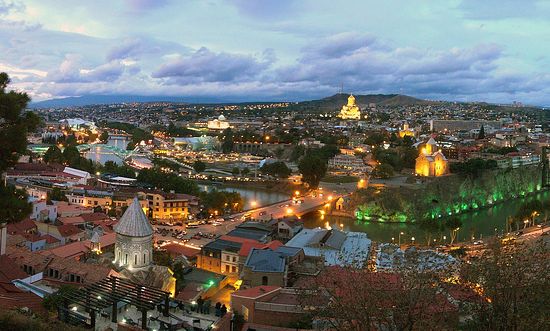 The Churches of Tbilisi
The Churches of Tbilisi 
